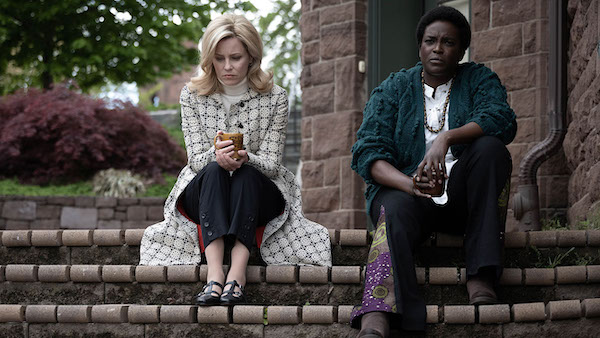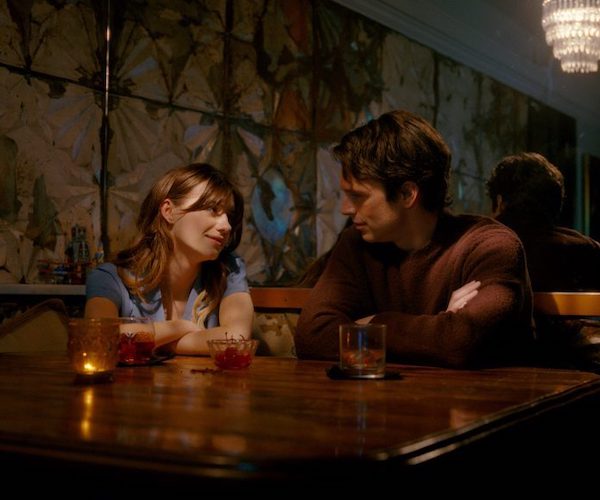Film Reviews: Sundance 2022, Dispatch #2 — In the Flesh
By Peg Aloi
My second Sundance dispatch deals with abortion, torture, and cannibalism: what a scintillating combination for a bitterly cold weekend! Sundance’s horror offerings so far are first rate.

Elizabeth Banks and Wunmi Mosaku in Call Jane. Photo: courtesy of Sundance Institute, Wilson Webb
Call Jane (not a horror film, though occasionally horrifying) seems to have all the ingredients for a political feminist juggernaut, starting with a directing debut from award-winning screenwriter Phyllis Nagy. Nagy previously adapted Patricia Highsmith’s novel The Price of Salt for the screen as 2015’s Carol. Here she creates a story based on the real life underground and anonymous abortion service of the ’60s that called itself “The Janes.” Elizabeth Banks is a housewife whose inability to obtain a medical abortion to prevent serious health complications leads her to seek Jane’s services. She finds herself drawn to supporting the organization’s mission.
The excellent supporting cast includes Sigourney Weaver, Wunmi Mosaku, Chris Messina, and a riveting Cory Michael Smith playing a rather unpleasant man who gets paid to do what other doctors refuse to. A great soundtrack and period details skillfully set the scene at the cusp of an explosion of social activism. Unfortunately, the screenplay (co-written by Hayley Schore and Roshamn Sethi) struggles to maintain its dramatic plausibility. The problem is that, because it feels duty bound to address every political facet of this too-human issue, the film dishes out too many clichés and contrived scenarios. Ironically, Mosaku’s character is the sole black woman we see fighting for equal access to this necessary procedure: this is a plot point that could have been expanded. Still, for viewers unfamiliar with the history of the fight for abortion rights, Call Jane is engaging and even compelling in its insistence that all women have the right to bodily autonomy. Premiering on the eve of the 49th anniversary of Roe v. Wade, which is now facing rough waters in the current Supreme Court, the timing could hardly be more propitious.

A cathartic moment in Speak No Evil. Photo: courtesy of Sundance Institute
Speak No Evil is a riveting Danish thriller that slowly builds into a terrifying conclusion. The film’s unusal mood is set from the beginning; we hear eerie music played over seemingly banal scenes and wonder why there is this forced tone. But from the moment a sociopathic man greets a fellow vacationer with a smile that is a little too eager, and words that are too effusively polite, we know something is very wrong.
Bjorn and Louisa are a Danish couple vacationing with their daughter Agnes in Tuscany. At the villa they’re staying in, where guests dine together at a long table, they meet Patrick and Karin, a Dutch couple their age whose son Abel is their daughter’s age. But whereas Agnes is your typically playful and talkative young girl, the young Dutch boy is silent and withdrawn. The Dutch couple invites their new Danish friends for a visit to their country home, and what begins as a friendly excursion soon turns uncomfortable. Bjorn and Louisa decide they should leave, but when they return for their daughter’s lost toy, their hosts convince them to stay. Director Christian Tafdrup has created a brutal film that nods to other sociopathic tales, such as Michael Haneke’s Funny Games, Paul Schrader’s The Comfort of Strangers, and Greg McLean’s Wolf Creek. Yet Speak No Evil is wholly original in the way it magnifies the social niceties that hide unimaginable cruelty.

Sebastian Stan and Daisy Edgar-Jones as a couple getting to know one another in Fresh. Photo: courtesy of Sundance Institute
Mimi Cave’s Fresh is a smart and shocking horror film that starts out like a hip romantic comedy. After Noa (Daisy Edgar-Jones) suffers through yet another crappy first date she decides it is time to give up on finding love. And then she meets a cute, smart, funny guy in the produce section of the local grocery store. Steve (Sebastian Stan) asks for her number and they meet for drinks and have a romantic one-night stand. Noa’s best friend Mollie (Jojo T. Gibbs) is thrilled her friend had a successful date, but she’s worried when Noa announces she’s going on a spur of the moment weekend getaway with Steve, who is a plastic surgeon. When Noa’s text message replies become increasingly weird, Mollie begins to suspect that Noa might be in trouble. But her suspicions can’t begin to comprehend the truth. Turns out the charming Steve has some strange appetites and his country home is a house of horrors. (To say more would give away the film’s central surprise, which is revealed about a half hour in.)
Lauryn Kahn’s sharp screenplay is full of twists and turns. But what makes this gruesome film a cut above the usual crop of body horror stories is its subtle commentary on the current state of romance and dating, particularly its reliance on impersonal technology, and how women bear the brunt of its perils and pitfalls. The meat market may have gone virtual, but it’s still a meat market. Warning: this film is not for the faint of heart.
Peg Aloi is a former film critic for the Boston Phoenix and member of the Boston Society of Film Critics. She taught film studies in Boston for over a decade. She writes on film, TV, and culture for web publications like Vice, Polygon, Bustle, Mic, Orlando Weekly, Crooked Marquee, and Bloody Disgusting. Her blog “The Witching Hour” can be found at themediawitch.com.
Tagged: Call Jane, Christian Tafdrup, Fresh, Mimi Cave, Peg Aloi, Speak No Evil
